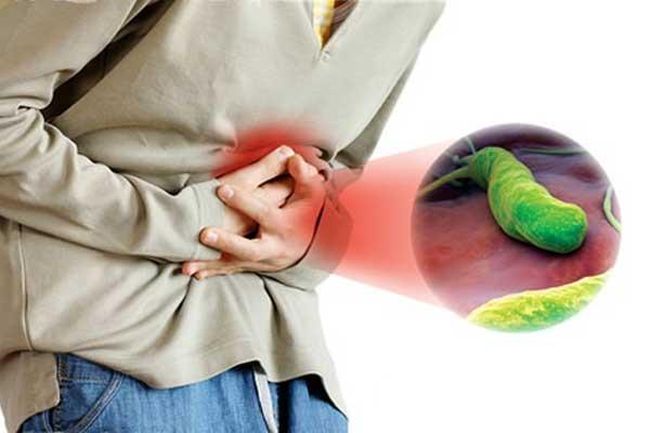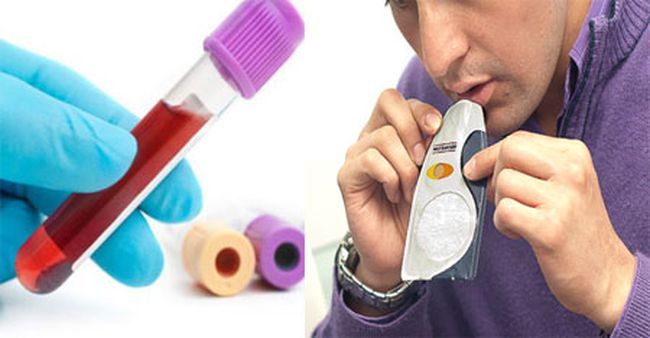Bacterium Helicobacter pylori - a negative microorganisms, living in the stomach and causes digestive diseases. This bacterium spiral - the only, who can survive and exist in the acidic gastric environment.
If before the exact cause of gastritis, stomach ulcers has not been established, then with the discovery of the bacterium became clear - the above-mentioned diseases is the organism. Since Helicobacter pylori infection - a common phenomenon, It is important to know, What symptoms indicate the presence of bacteria in the body and can I get rid of it.

symptoms
Different strains of the bacterium Helicobacter pylori are different symptoms, It is depending on it being treated. Several distinct forms heliobakterioza:
- Latentnaya. Infection with asymptomatic, the bacterium becomes inactive form. Such a flow is possible with strong immunity in humans or in certain strains of the bacterium itself. But, despite the lack of evidence of, Under favorable conditions, Helicobacter activated and has a devastating effect on the gastric mucosa and pancreas. A prolonged exposure to pathogens contributes to the appearance of cancer.
- acute gastritis. Symptoms of the disease - vomiting, pain in the epigastric. Most often becomes chronic.
- chronic gastritis. The main feature of the presence of Helicobacter pylori in the body. The disease is characterized by pain and heaviness in the stomach, appear heartburn, belching, bad taste in the mouth, nausea, start bleeding gums.
- chronic gastroduodenitis. Symptoms are the same, as gastritis, but the added loss of appetite, diarrhea or constipation. Characterized by the gastro, that the infection moves to the duodenum. The extent of the changes - poor, moderate to heavy, determined using endoscopy.
- peptic ulcer disease. Symptoms - abdominal pain after eating, heartburn, vomiting, belching, nausea. Develops on the background of adverse factors - smoking, alcohol, regular stress.
note! Besides shock syndrome, the presence of H. pylori may indicate acne on face. 85% people with "rosacea" diagnosis are carriers of this bacterium.

Diagnostics
To detect the presence pylori bacteria in the body, use several different methods for diagnosis. After polling the patient gives the physician referral for such analyzes:
- Blood test, which helps determine the presence of antibodies to Helicobacter.
- Fecal antigen helkobakter.
- Breath test Helicobacter pylori, which shows urease activity in the stomach bacteria.
- Urease test at EGD (fibrogastroduodenoscopy).
- cytological examination.
To get a more accurate result can be, appoint several studies, carried out in various ways.
Blood test
Blood on Helicobacter identifies antibodies to Helicobacter. However, this method can provide results lozhnootritstelny, while the presence of microorganisms. It happens, if the bacterium has already got into the stomach, but no pronounced immune effects of the recent infection (up to a month).
Blood on the determination of antibodies to Helicobacter pylori surrenders the morning on an empty stomach, and the day before you need to stop eating fatty foods. To make the analysis of venous blood sampling, and then placed in a special solution to further separate the plasma and study.
Deciphering the blood test for helicobacter pylori defines qualitative and quantitative indicators. Normally antibodies to Helicobacter pylori is not found. To determine the quantitative indicator, There are reference values. Their norms indicate on the form of the analysis results, but for an explanation should see a doctor.
analysis of feces
Fecal Helicobacter bacterium is convenient, you do not need the presence of a private person. For precision studies using PCR method (polymerase chain reaction).It has high accuracy, Unlike conventional fecal analysis. The latter does not give the right idea: while advancing through the intestines Pilar exposed to bile acids, lack of oxygen. All this contributes to the fact, that the number of microorganisms is reduced.
Fecal antigen Helicobacter pylori PCR needs to be done before, as the treatment is started. On the accuracy of the result can be reflected reception medicines, who took the patient to the analysis. These include the antibiotics penicillin, macrolides, metronidazol. Impurities in Kale (blood, bile, urine) also may adversely affect the accuracy of the final result.
Three days before collecting material for analysis is necessary to limit the use of dietary fiber, eliminate foods with dyes, inorganic salts. You can not use an enema, candles, kastorovoe butter.
The result of analysis can be:
- positive, that indicates the presence of bacteria in the body,
- negative, indicating the absence of H. pylori, any failure to comply with conditions of preparation.
Breathing urease test
Breathing urease test for H. pylori makes it possible to determine the presence of carbon dioxide. The fact, These microorganisms secrete urease: it protects the bacteria from exposure to gastric juice and at the same time splits urea into carbon dioxide and ammonia. Here the carbon dioxide and is detected in the investigation.

There are several options breath test. They have small, but important differences:
- Urea breath test, radiolabelled.
- test 13S.
- Helik test.
Urease test 13C safer, than radiolabeled, as for its conduct does not apply radioactive substances. A dough instead Helic carbon isotope labeled urea is used, making this option suitable for pregnant women and young children. But, Unfortunately, it is not accurate enough.
How to prepare for the test? In the evening before the study may be a light supper, followed by the consumption of food should be stopped. And an hour to eliminate drinking.
Decoding indicating two values: qualitative and quantitative. Quality shows on the presence or absence of bacteria (positive or negative), and quantifies the degree of infestation. There are four degrees: light, medium, severe and very severe.
The choice of method of research is discussed with your doctor. But we must remember, price on Helicobacter breath test varies depending on its accuracy and convenience.
Urease test at EGD
With fibrogastroduodenoscopy investigated the gastrointestinal tract and is sampling a very small piece of the mucous membrane of the stomach for research (It called a biopsy). Then it is placed in a special environment, with which the urease activity determined. In the presence of Helicobacter indicator replaces its color from yellow to crimson.
This takes into account the rate of change of color:
- During 24 hours - it indicates a small amount of bacteria, denoted by "+".
- Within two to three hours - moderate amount, indicated by "++".
- Within an hour - a significant number of, denoted by "+++".
cytological examination
Cytological examination - the most accurate test for Helicobacter pylori. For him, use the swabs from mucous areas, Taken during EGD. Areas selected suspicious, but without ulcers and erosions. The result may be positive, any negative.
Quantitative indicator indicates three levels of contamination:
- one plus (+) - low degree of, in the field of view of the microscope to 20 mikrooganizmov.
- two plus (++) - moderate degree, in the field of view of the 20 to 40 pylori.
- three plus (+++) - high degree of, found more 40 bacteria.
This method virtually eliminates false positive diagnostic result.
Treatment
Confirmed the presence of bacteria in the body, the following question, how to treat Helicobacter pylori infection and whether you want to do it.
About whether it is necessary to do so: this problem is solved with the doctor, based on the presence of pathological processes. If the inflammation on the gastric mucosa is not, the treatment is usually not assigned.

Eradication of H. pylori by means of the first or second line. If you did not work the first, the second circuit is assigned treatment.
- The first scheme - triple. It includes two antibacterial drug and a drug, reducing the production of gastric juice.
- The second scheme - a four. It includes two antibacterial drug, medication from the group of proton pump, reducing the production of gastric juice, and bismuth drug.
If the first and second circuits have not been successful, designate a third circuit. But before making the diagnosis of H. pylori strain sensitivity to antibiotics. Then individually selected treatment regimen.
Most often prescribed for the treatment of such antibiotics:
- azithromycin;
- clarithromycin;
- tetracycline;
- amoxicillin;
- levofloxacin.
chemotherapy drugs, used for eradication pylori:
- Metronidazol;
- trihopol;
- Makmiror.
The preparation of bismuth, having the name De-nol, It has a dampening effect on bacteria. Due to its ability to penetrate into the deeper layers of the gastric mucosa, drug covered by its action all bacteria. A means a group of proton pump inhibitors, such as Pariet, omeprazole, Omez, blocking the production of hydrochloric acid. It promotes the healing of ulcers and erosions and reduced gastric acidity.
Traditional methods and diet
Traditional methods can be used as an additional tool in the fight against Helicobacter pylori infection, Besides, compliance with recommended diet.
Important! Before taking over the treatment of folk remedies helikobaktera, you need to consult a doctor.
Most Popular Recipes:
- A decoction of flaxseed. A tablespoon of seeds pour a glass of water, boiled for five minutes, insist two o'clock, filtered, and the resulting goo take tablespoon before meals.

- The infusion of herbs: St. John's wort, yarrow and calendula. Mix them in equal proportions, pour boiling water and let stand. Then take half a cup three times a day.
- A decoction of calamus. Four tablespoons of the roots of plants Pour boiling water, insist half an hour, then taking a quarter cup before meals.
Diet includes a fractional power - 5-6 meals in small portions. Should be excluded from the diet of fried, greasy, acute, alcohol and carbonated drinks.
Prevention helikobakterioza - do not use someone else's dishes, hygiene, wash hands before eating. Treatment of Helicobacter bacteria serious, and, judging from the reviews, not always immediately gives a positive result. Therefore it is better to try to protect themselves from infection, than long and hard to treat it.












